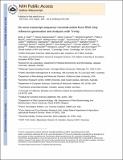De novo transcript sequence reconstruction from RNA-Seq: reference generation and analysis with Trinity
Author(s)
Haas, Brian J.; Papanicolaou, Alexie; Yassour, Moran; Grabherr, Manfred G.; Blood, Philip D.; Bowden, Joshua; Couger, Matthew Brian; Eccles, David; Li, Bo; Lieber, Matthias; MacManes, Matthew D.; Ott, Michael; Orvis, Joshua; Pochet, Nathalie; Strozzi, Francesco; Weeks, Nathan; Westerman, Rick; William, Thomas; Dewey, Colin N.; Henschel, Robert; LeDuc, Richard D.; Friedman, Nir; Regev, Aviv; ... Show more Show less
DownloadRegev_De novo transcript.pdf (1.504Mb)
PUBLISHER_POLICY
Publisher Policy
Article is made available in accordance with the publisher's policy and may be subject to US copyright law. Please refer to the publisher's site for terms of use.
Alternative title
De novo transcript sequence reconstruction from RNA-seq using the Trinity platform for reference generation and analysis
Terms of use
Metadata
Show full item recordAbstract
De novo assembly of RNA-seq data enables researchers to study transcriptomes without the need for a genome sequence; this approach can be usefully applied, for instance, in research on 'non-model organisms' of ecological and evolutionary importance, cancer samples or the microbiome. In this protocol we describe the use of the Trinity platform for de novo transcriptome assembly from RNA-seq data in non-model organisms. We also present Trinity-supported companion utilities for downstream applications, including RSEM for transcript abundance estimation, R/Bioconductor packages for identifying differentially expressed transcripts across samples and approaches to identify protein-coding genes. In the procedure, we provide a workflow for genome-independent transcriptome analysis leveraging the Trinity platform. The software, documentation and demonstrations are freely available from http://trinityrnaseq.sourceforge.net. The run time of this protocol is highly dependent on the size and complexity of data to be analyzed. The example data set analyzed in the procedure detailed herein can be processed in less than 5 h.
Date issued
2013-07Department
Massachusetts Institute of Technology. Department of BiologyJournal
Nature Protocols
Publisher
Nature Publishing Group
Citation
Haas, Brian J, Alexie Papanicolaou, Moran Yassour, Manfred Grabherr, Philip D Blood, Joshua Bowden, Matthew Brian Couger, et al. “De novo transcript sequence reconstruction from RNA-seq using the Trinity platform for reference generation and analysis.” Nature Protocols 8, no. 8 (July 11, 2013): 1494-1512.
Version: Author's final manuscript
ISSN
1754-2189
1750-2799